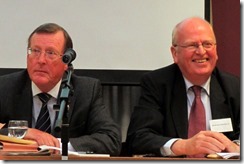 The Institute for British-Irish Studies (IBIS) at UCD and the Irish Association hosted a conference Saturday on ‘The Ulster Covenant and Contemporary Ireland’ at the Linenhall Library in Belfast. Addressed by a range of academics, former politicians, and journalists, the conference included historical and contemporary perspectives.
The Institute for British-Irish Studies (IBIS) at UCD and the Irish Association hosted a conference Saturday on ‘The Ulster Covenant and Contemporary Ireland’ at the Linenhall Library in Belfast. Addressed by a range of academics, former politicians, and journalists, the conference included historical and contemporary perspectives.
Former UUP leader David Trimble (or Lord Trimble of Lisnagarvey, as he is known these days) and Michael McDowell, former Tanaiste and Minister for Justice, Equality and Law Reform, were asked to provide a ‘political perspective’ on one of the panel discussions.
Trimble and McDowell’s contributions focused on historical rather than contemporary politics. I was struck by how both of their presentations in some way seemed to present in the best possible light any responsibility for violence that might be associated with their ‘side.’
For example, when discussing the Protestant churches’ involvement in promoting and facilitating Covenant Day, Trimble presented their role as largely benign, arguing that the churches came on board in an effort to avoid a repeat of the violent riots that accompanied the first Home Rule bill of 1886. Trimble added that the formation of the Ulster Volunteers, which became the Ulster Volunteer Force in 1913, was also an improvement on communal violence as it gave a potentially unruly populace better scope for ‘disciplined action.’
McDowell, on the other hand, presented the Ulster Covenant and the formation of the UVF as the spark that reignited a relatively dormant Irish republicanism, creating the conditions for the ‘emergence of a counterforce’ of physical force republicanism. This, he said, contributed to the downfall of John Redmond’s more limited vision of home rule inside the British Empire. McDowell added – tongue somewhat in cheek – that:
‘The Ulster Covenant therefore numbers among the founding documents of what I call Irish freedom.’
Neither presentation therefore left much space for debate about the morality of the Protestant churches’ close links with the politics of political violence; or debate about the morality of physical force republicanism.
Having said that, hearing Trimble’s and McDowell’s perspectives can help us understand how people of the time may have acted the way they did. Perhaps they chose what they saw as the lesser of evils in a context which was messy, fraught, and more complicated than we can appreciate 100 years on.
Whether seeking to understand the others’ perspectives can eliminate ‘what-aboutery’ or questions like ‘how could they?’ of course remains open for debate.
Trimble and McDowell agreed definitively on one aspect of the historical period, and that was that in 1912, people weren’t entirely sure what Home Rule would mean. They also agreed that each of the Home Rule bills got less and less ambitious. Looking back today we may see home rule simply as a form of limited devolution, but in a period when the British North America Act had granted dominion and limited autonomy to Canada, people could have imagined Home Rule as something more expansive. This also helps to explain the tension and anxiety of the time.
It was left to McDowell to say, at the culmination of his presentation, that today:
‘promoting reconciliation takes precedence over any constitutional priorities any of us might have.’
McDowell added that he sees the ‘decade of commemorations’ as an opportunity for ‘progress on mutual understanding.’
Unfortunately, the discussion remained somewhat detached from current anxieties about the Orange Order’s Ulster Covenant parade, planned for this coming Saturday. There’s still a risk that events on the streets in 2012 could undermine efforts for mutual understanding, let alone reconciliation.

Gladys is a Professor of Sociology at Queen’s University Belfast and a member of the Royal Irish Academy.
She is also a runner who has represented Ireland and Northern Ireland. She blogs on religion and politics at gladysganiel.com
Discover more from Slugger O'Toole
Subscribe to get the latest posts to your email.